Islands of Insight review
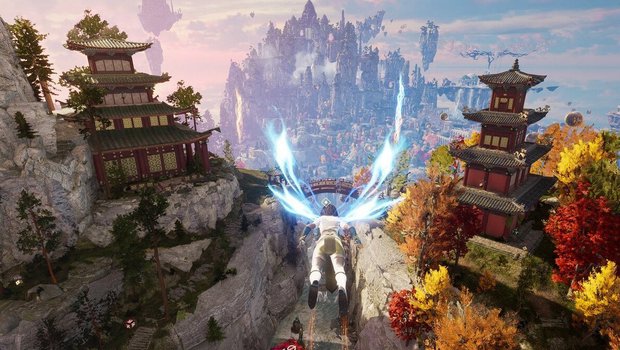
- 0 Comments
Puzzle lovers would be wise to pick up this ascendant collection of beautiful, open-world brain teasers
If you’ve played a massively multiplayer online (MMO) game before, you’ve likely learned this truth: they are, by their very nature, time-consuming beasts with sheer infinite amounts of content to consume, and essentially act like a black hole, sucking up all of your available leisure time to play other games. Enter Lunarch Studios’ Islands of Insight, an MMO (with an optional solo mode added after launch) of a different caliber, replacing combat and other RPG elements with pure, addictive puzzle solving that can easily turn what started out as a brief gameplay session into a full-fledged evening of rapid-fire dopamine hits. Alternatively, it’s just as easy to enjoy in moderation, taken in small, isolated doses. It’s a very different game from any others I’ve played – and perhaps the only one of its kind out there when played online – and it makes for a captivating experience that puts you into a zen state of mind.
Islands of Insight is all about its puzzles, and I mean that wholeheartedly. Bursting at the seams with over 10,000 brain teasers, the game is a puzzle fanatic’s dream come true. It presents a fantastical, gorgeous 3D world to freely explore in third or first person, and a serene, meditative soundtrack to accompany you while you do so, but it all comes back to the puzzles again and again. Everything else – the hinted-at narrative, the breathtaking mythological environments, the avatars of other players running around and occasionally crossing your path on the search for ever more mysteries to consume – are all secondary concerns.
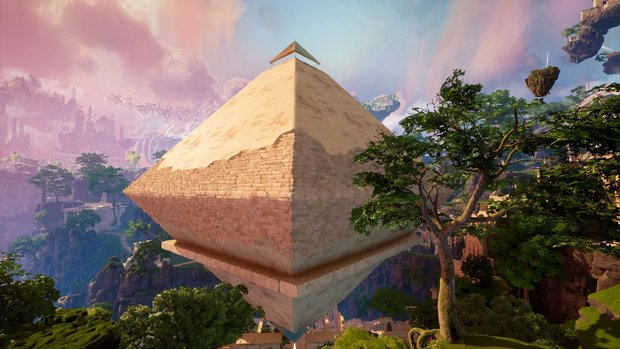
Let’s get the story out of the way, since the moment you move past the character creator, it all but fades into the background. You are the Seeker of knowledge, and it is your calling to explore scores of airborne island paradises to attain it. In practical terms, this means little more than solving as many puzzles as you have a taste for, occasionally engaging in two or three lines of philosophical dialogue with the Numah, sentient orbs that appear to be the embodiment of ancient beings who have existed in these lands for millennia. In my time with the game – around twenty hours, to give me a good taste of what it offers – these snatches of conversation aren’t so much building a narrative as establishing further flavor for the world, cementing it as a place with a history, even if that history is wholly inconsequential, and often incomprehensible, to your journey. Likewise, you’ll unearth Lore Fragments in your travels, which are similarly little tidbits of world-building rather than attempts at full-fledged storytelling.
But that’s okay, because the game isn’t about unraveling an engrossing tale. Rather, it’s about the meaning you attach to the experience for yourself as you zero in on its pure puzzle atmosphere. Each of the game’s floating islands is packed to the brim with a wide assortment of different brain teasers and challenges to partake of (or not, since you never need to complete them all). There’s a guiding thread offered that gently tugs you from one zone to the next in the form of a standard MMO questline, but it is up to you to choose which challenges to confront to unlock the path to the next area. Alternatively, it is possible to stray a bit off the beaten path and explore elsewhere – many of the islands are quite vast – or you could simply stay behind even after the game suggests you move on, as there are many more secrets to chip away at even after an area’s bare minimum has been met.
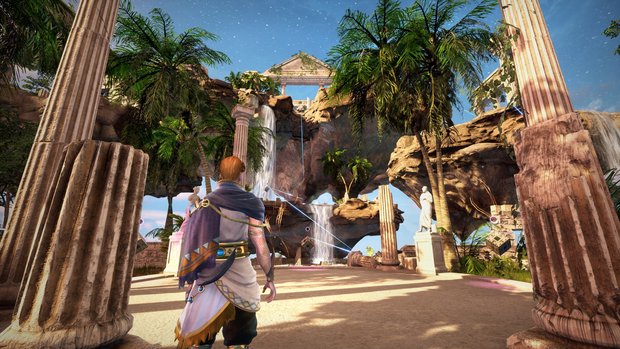
So let’s talk about the puzzles, since they are probably 95% of the reason you’ll come back to Islands of Insight again and again. With twenty-four unique puzzle types, there is certainly a lot on offer. With over 10,000 puzzles in total, you’ll be solving some varieties hundreds of times, though in order to satisfy the requirements to advance through the main questline, you’ll only have to solve a limited number of puzzles. Some areas require certain puzzle groups to be fully completed, but in general you’re given your pick of the litter. Each island is crammed full of them, and they’re all around you, free-floating as little puzzle orbs, built into the architectural design of some ruins, or even cleverly disguised within your natural surroundings. Wherever you turn are puzzles and more puzzles, sometimes ten or more all within close proximity to each other. Some puzzle types include helpful visual cues that inform you of their challenge level, while with others you won’t know whether to skip them until you’ve tried them.
Each puzzle you complete successfully nets you a currency called Sparks; earning enough of these results in the Auroral receiving a Mirabilis, which can be used to open the path to a new zone. It’s a convoluted economy with currencies that exist simply as a payoff to all that puzzling. Additionally, solving enough of the same type of puzzle nets you mastery points, which can be used to level up your character and purchase new abilities, many of them puzzle or traversal-related, like a double jump or the ability to use your wings to glide through the air to find – you guessed it – more puzzles! (The game can be played using a keyboard/mouse combo or a gamepad, though I found moving the on-screen cursor using the analog sticks – for those puzzles that utilize it – to be far less optimal than simply ditching it in favor of standard mouse controls.) All of these are nice bonuses, though no matter what abilities you unlock, the gameplay loop remains the same.
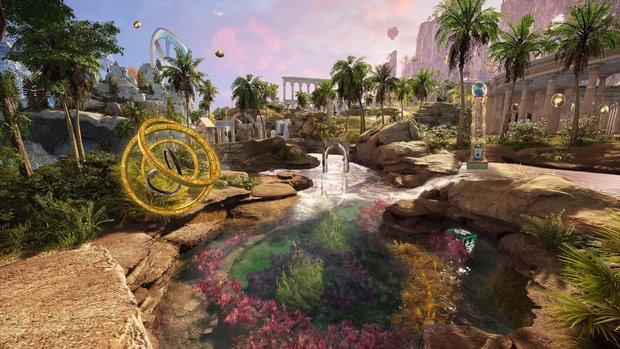
Considering the sheer deluge of puzzles presented here, I am honestly a little surprised to find that I quite like the vast majority of them – and there are still a few spaces left blank in my puzzle-dex for new types I haven’t yet encountered. In general, the puzzles seem to fall into one of three main categories. Those who enjoy logic puzzles will find plenty to love here, as the early game especially seems heavily geared toward them, whereas more variety sneaks in as you progress. Many of these are grid-based and revolve around completing patterns, linking numbers, building differently sized grid areas without overlapping, making sure matching colors connect to each other, or filling in a Minesweeper-esque board. Additionally, there are a large number of Match-3 boards set into hillsides and attached to building walls all around the world. These puzzles are solved by clicking on them, which zooms you in to a close-up view that you can manipulate, with unique rules or restrictions clearly labeled on-screen.
A second puzzle type is movement-based, and will appeal to those with a kinetic or spatial bent. You’ll be given time limits to play a game of tag with flying orbs, make a mad dash to touch every orb in a set before time expires, figure out how to pierce series of interlocking rings so that your beam goes through all of them at once, or tumble blocks around a board to fit into preset spaces. An impressive example is the full-scale crystal labyrinths, akin to carnival fun house mazes, filled with dead ends, pitfalls, and launch platforms that let you ascend to higher floors, which you must traverse to reach their exit. Sometimes even just exploring far-flung nooks and crannies or accessing out-of-the-way puzzles can be challenges in and of themselves.
Last but not least are challenges for those who’d rather put their energies toward environmental puzzle-solving. Islands of Insight includes varied exploration challenges such as locating two blocks with matching symbols that must be visible from the same vantage point, scavenger hunts where you’re searching for hidden pentad orbs within a given area, geographical challenges that display an image of a nearby landmark when viewed from a specific spot that you must then locate, or strange markings you may notice within the environment that line up to form a pattern when viewed from a certain perspective. A further type of environmental challenge are the hidden object puzzles, though these aren’t of the seek-and-find variety you might associate with that name, but rather hard-to-see rings you must jump through and invisible archways that you won’t see until you’re about to walk through them, both of which can be found along your travels if you keep a watchful eye out.
If that sounds like a lot, keep in mind that this isn’t even an exhaustive list, as there are still several other puzzle types I haven’t mentioned. Really the only challenge that I quickly grew tired of were the Morphic Fractals, psychedelic tie-dye color patterns that you must recreate by subtly rolling your mouse across a surface. I found them difficult to control with any kind of precision and wound up relying on patience and luck instead. It’s the one puzzle type I finally just had to make the decision to steer clear of while focusing instead on the rest.

If you decide to engage in the game’s online mode, you will occasionally encounter other players going about their puzzle-solving business alongside you. Thankfully, this isn’t a competitive game, and the presence of others never puts you at any disadvantage. Puzzles aren’t on timers and don’t become temporarily locked, and multiple players can work on the same puzzle without getting in each other’s way. There don’t seem to be any puzzles that require players to work cooperatively either. You can send messages to other players via a menu by clicking on their avatars if you like, and there’s a running list of other players’ puzzle achievements ticking by on the side of your screen, but there’s nothing about the experience that requires or even encourages a social element.
The only benefit – and I’m reaching a bit here – is that seeing another living person’s avatar every now and then makes the sprawling world feel a little less lonely. But with this many puzzles at your fingertips, who cares, am I right? All this begs the question of why this is even an MMO in the first place. The answer is: I’m not sure. It honestly doesn’t need to be, and with the newly added solo mode, which has already become my go-to way to play this game, it no longer ever has to be.
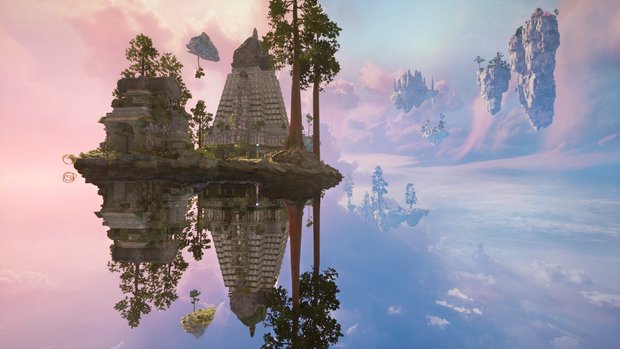
Lonely or not, Islands of Insight’s world is also quite lovely. As a frame of reference, imagine fantastical depictions of Greek mythology’s Mount Olympus, a paradise of flowing rivers, clear blue skies, and majestic hillsides topped with ruins of once-grand temples and towers. Or perhaps it’s more of a Garden of Eden-esque aesthetic, with untouched wonders of man and nature painting a picture of what once was. Other historical influences make themselves known in equal measure – an obvious example being the behemoth pyramid-like structure you’ll see floating in the sky before long (which you can actually glide to and clamber around on). And as you catch some air and gaze into the distance, you’ll see grand crystalline structures, imposing architecture from any number of cultures, verdant greenery and other bewitching vistas. The game’s visual designers deserve some hefty praise – assuming you have the horsepower to view them at their intended clarity.
Like the visuals, the game’s musical accompaniment is suitably serene and ethereal as well, doing its part in establishing a zen vibe. The world sounds as peaceful as it looks, and the classical-style compositions feel right at home with the mythical setting and fantasy trappings. It’s a shame, then, that variety doesn’t seem to have been much of a focus, as it isn’t long before the same tracks begin repeating ad nauseum. It’s understandable, really; it would be quite impossible to create a score that could easily last hundreds upon hundreds of hours without becoming repetitive. But there is a simple solution to this issue, which actually makes the game even more enjoyable: apart from one particular puzzle type that requires listening to audio cues to solve, Islands of Insight is tailor-made to just turn the volume down and put on your favorite personal playlist. This musical malleability makes coming back to the game as time goes on all the more appealing.
Slightly less laudable is the fact that the game comes with suitably hefty technical specs, and can be a bit of a beast both for one’s gaming rig and apparently for its own servers. To start with, I was unable to run the game on its minimum settings, necessitating a small (and admittedly much-needed) upgrade to my hardware. But even then, actually logging into the servers for the online mode proved to be hit or miss, with multiple attempts sometimes necessary due to lost server connections before a session could even get underway. Once in the game, I still experienced the occasional bit of server lag, pushing my character around a couple of steps, wherever the server last logged it.
However, this is really more of a minor speed bump, since you’re never in any peril and the game won’t let you die – even if you fall or get pushed off an edge into sheer space, you just get teleported back up moments later. Playing in solo mode of course improves upon its performance, removing server lag completely, though be aware that, due to progress being saved locally as opposed to on the server, progress made in solo mode does NOT carry over to the online game.
Final Verdict
Islands of Insight is certainly unique, with a gameplay formula that sets it apart from many of its contemporaries. The “puzzles above all” approach is something not often seen, but it’s pulled off well here, creating an experience that is relaxed and relaxing in equal measure. It’s not for those looking for a well-rounded adventure experience, but it is so chock-full of challenging goodness that it effortlessly creates that “just one more” feeling even at the end of a lengthy gaming session. However, the massive quantity of puzzles does eventually reach a point of diminishing returns; as much fun as they are, each time you finish a puzzle, two more of the same kind seem ready to take its place. So once the novelty wears off, Islands of Insight is perhaps best experienced in moderation, with intermittent breaks and tailored to your liking by engaging only in the content you prefer. Those that do will find vacationing in the skybound island paradise a stimulating and worthwhile holiday.
Hot take
Story fans should probably steer clear, but if you enjoy a good challenge, pick out your favorite musical playlist and settle in to explore Islands of Insight’s gorgeous puzzle-lover’s paradise. Just be sure to pack accordingly, as you could be there a long, long time.
Pros
- Puzzles, puzzles, and more puzzles!
- Tons of brain teaser variety, and flexibility to focus on the types you like most
- Serene, mysterious paradise consistently offers new and gorgeous sights to behold
- Successfully evokes that feeling of “just one more” even in long gaming sessions
- Postlaunch solo mode is a very welcome addition
Cons
- With so much content, a feeling of diminishing returns does settle in eventually
- MMO aspect is largely neglected in online mode
- Taxing hardware requirements and server lag make online play a challenge
Pascal played Islands of Insight on PC using a review code provided by the game's publisher.


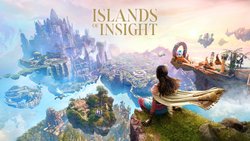








0 Comments
Want to join the discussion? Leave a comment as guest, sign in or register in our forums.
Leave a comment